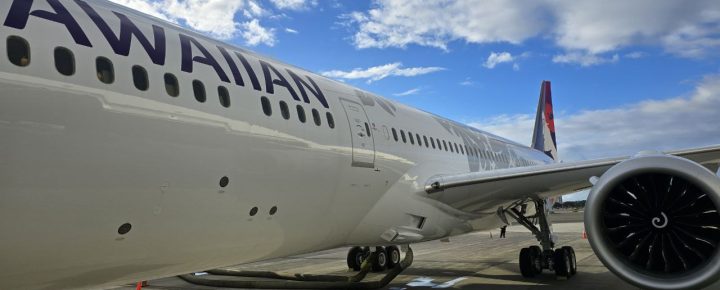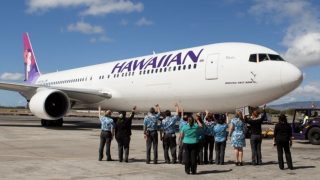The potential merger between Alaska Airlines and Hawaiian Airlines has been a hot topic in both Hawaii and the greater U.S. airline industry. Today’s developments only add to the complexity and concerns.
The U.S. Justice Department (DOJ) just extended the review period for this merger until August 15, 2024, highlighting ongoing deliberations and alleged internal divisions within the department. This move comes after reports indicated a possible lawsuit to block the merger due to antitrust concerns.
“Justice Department officials remain divided internally over whether to file a lawsuit to block the deal given the small relative size of Alaska and Hawaiian compared to the US’s four major airlines, according to people familiar with the review. Federal officials have shared their potential reservations with state regulators who are also reviewing the transaction, said the people, who asked not to be identified discussing internal deliberations.”
Bloomberg
Background of the proposed Hawaiian Airlines acquisition.
The deal, first announced last December, proposes that Hawaiian become a wholly-owned subsidiary of Alaska Airlines. This deal is valued at approximately $1.9 billion and aims to create a stronger competitive force against the four major US airlines flying to Hawaii, including American, Delta, Southwest, and United.
However, the deal has sparked significant scrutiny from the DOJ and state attorneys general due to its potential impact on market competition and consumer choice.
Internal DOJ disagreements are revealed.
According to Bloomberg, DOJ officials are divided on whether to proceed with a lawsuit to block the merger. The core of the debate hinges in part on Alaska Airlines and Hawaiian Airlines’ relatively small size compared to the major US airlines. There is also debate as to whether the merger would significantly harm competition or conversely benefit consumers by expanding travel options.
The combined entity of both carriers would control more than 50% of Hawaii’s airline market.
While still small in the overall U.S. airline landscape, there is the potential that this deal could lead to reduced competition and higher prices for Hawaii travelers and residents.
Others, including Alaska, however, believe the merger would enhance competition by offering more destinations and a stronger competitive alternative to the behemoth major airlines.
Implications for Hawaii travelers.
This merger could have mixed implications for travelers to and from Hawaii. On one hand, it would streamline operations, improve route networks, and potentially offer more competitive pricing due to increased operational efficiencies.
On the other hand, the consolidation of two significant players in the small Hawaii air market could reduce competition, leading to higher fares and fewer choices.
Broader U.S. airline market impacts.
This merger is not just a regional concern for those focused on Hawaii travel but also a significant issue in the overall U.S. airline industry. The federal government’s tough stance on airline mergers, as seen with the denial of the JetBlue-Spirit deal as well as the JetBlue-American regional breakup, suggests an environment of rigorous scrutiny. It is widely believed that the outcome of this deal will set a precedent for future airline mergers and acquisitions, creating much broader implications.
Airline investor reactions.
Investors have reacted to these developments with fluctuating stock prices for both airlines. Following the announcement of the extended review period, Hawaiian Holdings’ stock saw a 12% increase today, which reflects both investor optimism and speculation about the meaning of this delay and the likelihood of the deal’s potential approval.
In the interim, Hawaiian Air losses continue in 2nd quarter.
Today the airline also announced its performance for the 2nd quarter of 2024, wherein they achieved some success in reducing the first quarter 2024 Hawaiian Air loss rate. It was about half in Q2 what it was in Q1, or about .75 million dollars per day.
But investment analysts Zach’s said, “This quarterly report represents an earnings surprise of -7.87%. A quarter ago, it was expected that this parent company of Hawaiian Airlines would post a loss of $2.75 per share when it actually produced a loss of $2.77.”
For the Hawaii travelers and the U.S. airline industry, what’s next will be critical.
The decision by the DOJ will have huge impacts on 1) the future of these two airlines, 2) what the Hawaii air travel market will look like going forward, and 3) the competitive landscape of the entire US airline industry. There is a great deal at stake, more than would appear likely given the small size of this deal.
The DOJ’s delay reflects just how much is at stake as well as the complexity of this Alaska-Hawaiian deal. While the outcome is uncertain, the implications are enormous, making this a pivotal moment in U.S. airline history.
We welcome your input!
Get Breaking Hawaii Travel News







The deal was first announced on December 3, 2023, not December 2, 2023.
If the merger is approved, how will that affect the Hawaiian Airlines’ frequent flier program and the balances of miles that people have accrued?
Spent most of my miles for a trip to the Cook Islands in January. I just hope they last that long…
Good day~ Please keep in mind that there are three possible outcomes. 1-DOT allows merger to proceed. 2-DOT requires changes to the agreement (usually competitive concentrations). 3-DOT rejects the merger application.
Do not assume that option 3 is the front runner. Easy to see everthing as half full. Let’s wait for the final decision and keep in mind there is a 33% chance of option 3 with a 66% chnace for the other two. Mahalo
My thoughts of the merger. Allowing Alaska Airlines to dominate the industry and grow. They’ll be the only airline with domestic, Hawaii, and international routes. Alaska Airlines currently flies to many destinations, including Vancouver, Alaska, Mexico, and soon Asia and Australia. United, American, and Delta probably opposed the merger, knowing it wouldn’t be approved. The Hawaii route would be a significant advantage for Southwest, as they don’t fly to Canada, Alaska, or international destinations besides Mexico, and their route network differs slightly from Alaska Airlines.
I don’t believe the merger should go through.
Aloha Rob and Jeff. Thanks for keeping us informed. Your article states that “the merger would reduce competition…” Correct me if I’m wrong, but won’t competition also be reduced when Hawaiian goes under?
I don’t get it … Given that Alaska is proposing to merge and operate Hawaiian Airline as a separate brand, then what will actually change?
The same small combined company’s Alaska & Hawaiian painted planes landing at the same airports as the “big four” airlines, all of them dynamically pricing their seats until the weakest performing airline finally gives up and leaves the Hawaii market to the surviving four.
I have read all of the BOH articles on this topic and I would certainly mourn the demise of Hawaiian Airlines and the impact on the Hawaiian employees and Hawaii citizens. I just have a difficult time seeing how the Hawaiian Airlines brand will survive with their dire financial performance carrying them into either the merger or bankruptcy.
Competition and capitalism are, by design, harsh for the weakest. Just ask Nokia and Microsoft’s “Windows phone,” after Apple introduced the iPhone.
How can Hawaiian survive losing $750,000 every day?
I thought it was over 1 million at this point
Hawaii doesn’t have any person with the stature of Dan Inoyue to step in and kill this or make it happen. We are at the mercy of wishy washy people with wet fingers to see which way the wind is blowing, or money is flowing.
How ironic that the deal extension on the 15th is Exactly one day before the 16th, whereby the stock options trading will cede for the month.
Don’t tell me the market makers aren’t involved here behind the scenes as well.
As far as I’m concerned, even with BOH’s reporting, there’s not going to be a shortage of additional carriers to serve Hawaii. If this isn’t approved, I’ll be turning over a lot of rocks…
The mention that “Federal officials have shared their potential reservations with state regulators who are also reviewing the transaction” probably means that the DOJ does not think that they could successfully block the deal, but are hoping that the State of Hawaii does it for them. Hopefully this merger will occur, as Hawaiian Air clearly lacks the scale to be profitable in its current markets given the competition from Southwest, United, and Delta.
I think it’s got to be referring to California. (Though possibly Nevada too?)
Washington is where Alk’s based, so probably cozy with it. HI state gov probably wants the merger to go through so that it’s flagship carrier doesn’t go bankrupt.
That leaves what remaining state where the two airlines have overlapping market share, which happens to also be a politically activist state? — Got to be Cal.
That said, I would think in that scenario an angry HI state official might make a phone call to their corresponding Cal official and ask them to knock it off. Because, truth is, this deal just matters exponentially more overall to HI than it does to Cal.